Natural Language Processing (NLP) is a branch of artificial intelligence that deals with the interaction between computers and human languages.
This branch of AI contains various subfields like speech recognition, text analysis, speech synthesis, dialogue systems, etc.
All of these are extremely helpful in building a system that performs language-based tasks, notably grammar checkers, voice text messaging, chatbots, and many more.
As natural language processing becomes a crucial element of numerous software, demand for NLP specialists sharply increases. This fact makes NLP an unsurprisingly lucrative career skill.
According to Ziprecruiter’s data, specialists in the US who master NLP earn as much as $123,974, which is significantly higher than most programming jobs.
If you are looking to get started with NLP, I recommend taking online courses on the topic. However, you cannot just take random natural language processing courses, as some lack quality and can do you more harm than good.
I decided to do the heavy lifting for you. This post features a curated list of the best NLP courses available in the market, along with their pricing and pros and cons for each course. You can then select the one that suits your learning style and start learning right away.
Affiliate Disclosure: This post from Victory Tale contains affiliate links. If you purchase NLP courses through them, we will receive a small commission from course providers.
Nonetheless, we always value integrity and prioritize our audience’s interests. You can then rest assured that we will present each NLP course truthfully.
Things You Should Know
Prerequisites
Natural Language Processing is an advanced concept. Thus, you need to have background knowledge in the following before taking any course:
The links below will lead you to the lists of the best courses on that topic.
- College-level Probability & Statistics (alternatively, Statistics for Data Science)
- College-level Calculus & Linear Algebra (required in some courses)
- Advanced Python Programming, notably Object-Oriented Programming (OOP) and numerical libraries such as NumPy and Pandas
- Machine Learning concepts: Relevant Machine Learning models and algorithms
- Deep Learning (Neural Network Architecture)
- Deep Learning frameworks such as PyTorch, Tensorflow, or Keras (preferably Tensorflow)
Regarding other programming languages, I have found very few courses that use R. However, I don’t think their quality is sufficient. Hence, all courses that this post features use Python.
Criteria
Below are my criteria for the best natural language processing courses.
- Credible instructors
- User-friendly, reliable learning platform
- Up-to-date (most of the course content is not outdated)
- High-quality course materials
- Provide excellent value for money
- Positive reviews from real students
- My personal experience with the course (if any) must be positive.
1. Become a Natural Language Processing Expert
This nanodegree program from Udacity is unarguably one of the most comprehensive natural language processing courses available online.
In collaboration with Amazon Alexa and IBM Watson, this program provides students with opportunities to learn natural language processing from experts who have had years of experience in the field.
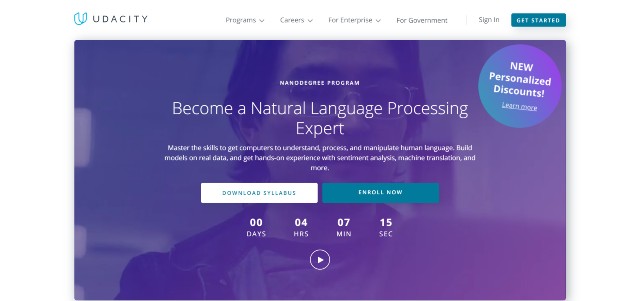
Course Content
This program consists of three minor courses as follows.
1. Introduction to Natural Language Processing – The first course will explain the text processing concepts, including stemming and lemmatization. Later on, you will use machine learning methods in sentiment analysis.
2. Computing with Natural Language – The second course will discuss advanced NLP techniques such as word embeddings, deep learning attention, and how to use recurrent neural networks (RNNs) to build a translation model.
3. Communicating with Natural Language – The final course will drill deep into voice user interface techniques, which can be used to build an automatic transcription tool or AI voice generator.
Each minor course has quizzes, assignments, and, most importantly, real-world projects. For example, you will build a speech tagging model in the first course and an English-French machine translation tool in the second.
Once you complete the project, you will possess three real-world tools that you can add to your GitHub portfolio to showcase your skills and gather tons of hands-on experience that you can develop in the process.
Udacity suggests spending 10-15 hours per week on the program, and you will complete it in approximately three months. As the course is 100% self-paced, you can freely set your schedule.
However, keep in mind that your tuition (see #pricing below) will increase along with your time on the course. Thus, it would be optimal to finish the program in three months or even earlier. Rushing is not recommended, though.
Student Support
Once you enroll in Udacity’s program, you will gain access to three mini-bootcamp support as follows.
Technical Support – If you get stuck, encounter any technical issues or have any questions regarding the courses, you can use the Student Hub’s chat interface to ask your mentor questions 24/7.
Most likely, the personalized response from your mentor will arrive in less than an hour. Hence, you don’t have to wait forever for the instructor to reply to your inquiries again.
Project Reviews – Once you work on the projects, you can make unlimited requests for experts to review your projects. They will provide personalized responses and inform you about best practices to strengthen your skills.
Best of all, you will receive a personalized review in slightly more than an hour. You can then improve or modify your project and ask experts to review it again, hence creating a healthy feedback loop that aids your learning.
Career Services – The team will review your resume, LinkedIn profile, and GitHub portfolio to ensure that your job application is up to professional standards. This service is highly beneficial if you aim for a lucrative career at leading tech giants like Amazon, Facebook, or Google.
From an overall perspective, this level of support differentiates Udacity from its competitors. The team will support you throughout the entire learning journey, thus permanently eliminating any frustration caused by the instructor’s inactivity, and bugs & errors on the assignments and projects.
Pricing
Udacity uses a subscription model. The monthly tuition is $399 or $339 (15% off) if you pay for three months upfront.
However, Udacity frequently offers personalized discounts as high as 75%. You just need to create a free account, and you will gain access to the deals right away.
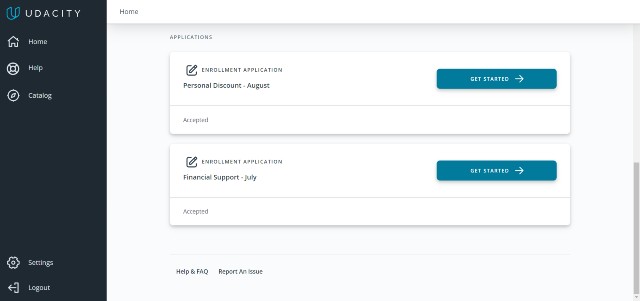
With these discounts, you can enroll in a top-notch at a low price of $100 per month. Considering all course materials, projects, and quality support, I am confident that the program is worth the price.
Pros and Cons
Pros
- Learn NLP from experts with years of experience in the field
- Well-structured, up-to-date curriculum
- Self-paced learning
- Numerous practical exercises and hands-on projects to obtain hands-on experience
- Excellent and speedy technical support that apparently trumps other courses
- Unlimited Project Reviews
- Career services are a big plus.
Cons
- Expensive compared to other natural language processing courses. However, discounts can cut the tuition down by 75%.
- Require a high weekly commitment if you don’t want to pay extra tuition
2. Natural Language Processing Specialization
This Coursera specialization from Deeplearning.ai offers exceptional training that helps students break into the NLP space. You will learn from three experts who specialize in training AI practitioners.
Note: You will need background knowledge in calculus and linear algebra for this specialization.
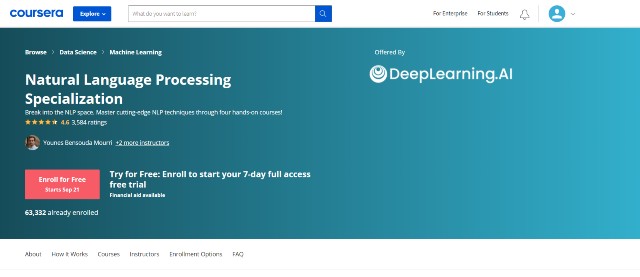
Course Content
The specialization comprises four courses as follows.
1. NLP with Classification and Vector Spaces – The first course in the specialization will introduce you to Natural Language Processing. Later on, you will start working on the projects.
First, you will use logistic regression and Naive Bayes to perform sentiment analysis of people’s tweets. Then, you will use vector space models to find the relationship between words and visualize them.
Finally, you will build a basic machine translation algorithm that can translate between English and French.
2. NLP with Probabilistic Models – In essence, the second course will teach you how to build auto-complete and auto-correct algorithms popularly used in numerous editing software. You will use different tools and techniques, such as the N-gram language model and dynamic programming.
Subsequently, you will build a Word2Vec model that uses neural networks to compute word embeddings.
3. NLP with Sequence Models – The third course will drill deep into intermediate and advanced topics. You will train neural networks to perform sentiment analysis, generate synthetic Shakespeare text, perform NER (named entity recognition), and compare questions to identify synonyms.
4. NLP with Attention Models – The final course will cover advanced real-world usage of NLP. You will use various models and tools to perform advanced tasks, including translating English to German, summarizing text, and building a chatbot.
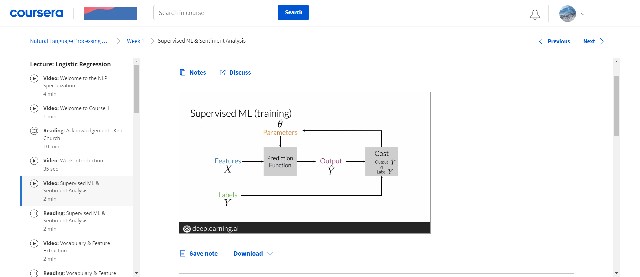
As a project-based specialization, you will spend most of your learning time on NLP tasks while learning crucial concepts along the way. Once you complete all the courses, you will be able to build NLP systems confidently on your own.
Regarding the pace, you should spend 7 hours per week on the program, and you will finish it in 4 months.
Auditing the course is entirely free. Alternatively, the full course costs $49 per month. I suggest you start a free 7-day trial to evaluate the entire program before making decisions.
Pros and Cons
Pros
- Learn from leading AI researchers
- Well-structured and comprehensive curriculum
- Project-based learning: You will work on numerous tasks and be able to build NLP systems of your own.
- Manageable pace
Cons
- Most reviewers complained that some parts of the program do not have adequate explanations.
Lazy Programmer’s Series
If you are looking for affordable courses to master NLP, you don’t need to look elsewhere besides Udemy.
Lazy Programmer is a knowledgeable and experienced AI engineer who creates a series of machine learning, deep learning, and AI courses on Udemy. I have taken some courses with him and appreciated the quality. Hence, I decided to recommend him to you.
Note: Course #3 to #5 on this list are parts of his series. However, unlike Udacity and Coursera, you have to purchase each separately since Udemy offers no bundle pricing.
3. Data Science: Natural Language Processing (NLP) in Python
The third course will explain the basic concepts of Natural Language Processing and its widespread applications. You will then work on several projects that will help you enhance your knowledge and skills.
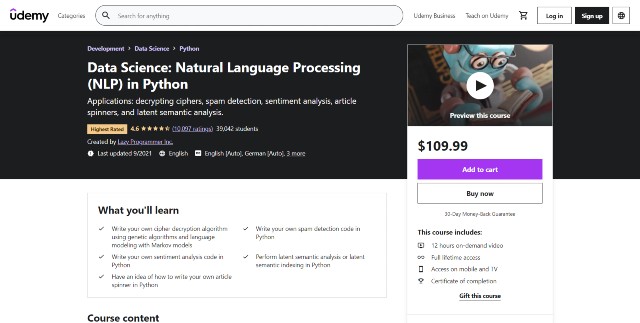
Course Content
Below is a summary of what you will learn from the course.
- Machine Learning Review (Regression, Classification, Comparison of machine learning models)
- Markov Models (Building a text classifier and a language model)
- Write your cipher decryption algorithm
- Build a spam detector and a sentiment analyzer
- Latent semantic analysis
- Build an article spinner (using the Trigram model)
The video content is 12 hours long. You need to prepare to get your hands dirty. This course does not teach you how to use the API. Instead, you will learn to build these tools from scratch and understand the entire process, which is an excellent strategy to develop your skills gradually.
Reviews: 4.6/5.0 from 10000+ ratings
4. Natural Language Processing with Deep Learning in Python
The fourth course will be more in-depth than the third. You will understand how to utilize deep learning approaches with Natural Language Processing.
Note: You will use Tensorflow or Theano in all parts of this course (you can choose either, as the instructor will provide instructions to both). Thus, you should have some experience in using either library beforehand.
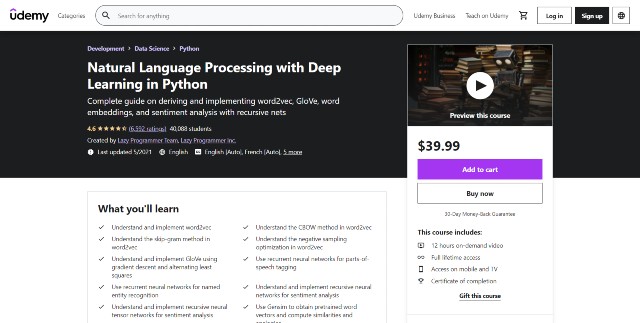
Course Content
A summary of all course content is as follows:
- Theano and Tensorflow review
- Introduction to Word2vec
- Language modeling and neural networks
- Word embeddings (using Word2vec or GloVe)
- Use neural networks to provide solutions to NLP problems
- Recursive neural networks
The video content is 12 hours long. However, the actual length is only 10 hours, as Lazy Programmer utilizes the same content (Python Review and learning strategies) in all of his courses.
Reviews: 4.6/5.0 from 6590+ ratings
5. Deep Learning: Advanced Natural Language Processing and RNNs
This advanced course will tackle the most challenging concepts of Natural Language Processing. You will learn to build a text classification system that can be useful in performing several tasks, such as spam detection, sentiment analysis, and many more.
Note: You will be using Tensorflow and Keras. It is thus vital that you master them before enrolling.
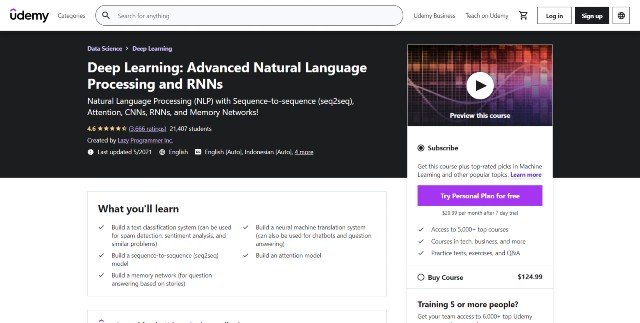
Course Content
Below is a summary of the course content.
- RNNs, CNNs, and word embeddings
- Bidirectional RNNs
- Sequence-to-Sequence Model (Seq2Seq)
- Attention
- Memory Networks
Similar to his other courses, this one is also project-based. You will create tools that are in demand (chatbots, spam detectors, etc.) utilizing advanced NLP techniques and deep learning.
This course is relatively short. You will have only 6 hours of content (not taking duplicate content into account). However, very few online courses cover such advanced topics. This fact makes this course worth taking.
Reviews: 4.6/5.0 from 3600+ ratings
Pros and Cons of the Series
Pros
- Learn from a highly knowledgeable AI engineer
- Well-structured curriculum
- Include detailed explanations of both the concepts and the how-tos.
- Project-based learning: You will work on multiple projects and understand each concept through doing and experimenting
- Lifetime Access + 30-day money-back guarantee
Cons
- Some courses are math-heavy, which may not be desirable for some students.
- Purchasing all three courses can be expensive, though Udemy frequently offers discounts (you can get it at $20 each or lower)
Exclusive: ProjectPro (For Advanced Learners)
After taking several NLP courses, you should work on as many projects as possible to enhance your skills. Once you have completed them, you can add those projects to your resume and Github portfolio to showcase your skills to potential employers.
You can come up with project ideas, choose the dataset (i.e., from Kaggle), and complete all the processes from start to finish. However, this can be too time-consuming and overwhelming, especially for students with no professional data science experience.
This is because there are no solution codes or explanatory videos like in data science courses. You can get stuck in specific issues for months. Hence, this path may not be worth your time and effort.
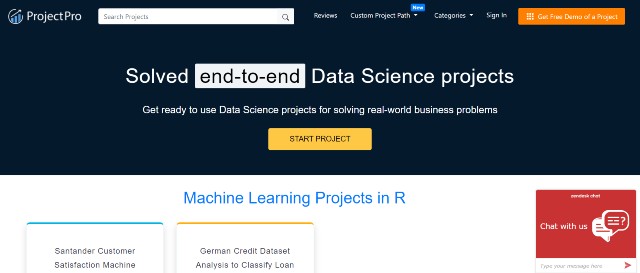
If you are in this situation, you may want to consider ProjectPro. This platform is the ultimate solution for data science students who need more projects for their resumes.
You will gain access to as many as 181+ curated, verified, pre-solved projects with a solution code and in-depth explanatory videos. Hence, you don’t need to spend hours, days, or weeks posting on online forums to ask for assistance anymore.
Program Details and Resources
Among its 181+ data science projects, a dozen are NLP projects. Below are some that I find compelling.
1. Predict Quora Question Pairs Meaning Using NLP in Python – In this project, you will help Quora improve the user experience by applying advanced NLP techniques to analyze whether two questions on the platform are duplicates.
2. Build Multi-Class Text Classification Models with RNN and LSTM – You will create RNN and LSTM models to perform text classification on a dataset of two million customer complaints.
3. Natural language processing Chatbot application using NLTK for text classification – You will build a conversational engine for a chatbot using the NLTK text classification library and relevant techniques.
All ProjectPro projects are end-to-end. You will learn and enhance your skills in all data science processes: data sourcing, data cleaning, data analysis, and visualization.
Thus, you will obtain the necessary and practical hands-on experience and confidence, which will help you gain an edge in interviews and finally receive a lucrative job offer.
Below are the resources that come with each project.
- Detailed project descriptions and comprehensive datasets to help you get started
- 2-5 hour explanatory videos
- Solution code
- Informative documentation
- Premium Email support
These resources could save hundreds of hours of your valuable time, so you can complete more projects and become job-ready faster than your peers.
Pricing
The subscription costs $876 per year. Besides the learning resources above, you can schedule 1-on-1 sessions for experts to review your resume and prepare you for an interview.
Subscribing to ProjectPro is risk-free because you can always ask for a full refund within 90 days (no question asked).
Other Alternatives
NLP – Natural Language Processing with Python – This Udemy course from Jose Portilla provides an excellent overview of natural language processing. However, Jose has not updated this course since 2019, so most course content is outdated.
Deep Learning and NLP A-Z™: How to create a ChatBot – This Udemy course from Hadelin de Ponteves and Kirill Eremenko covers the same content as the fifth course on the list. However, the course uses Seq2Seq models in Tensorflow 1.0, making the content outdated.
Still, both instructors are highly knowledgeable, and they explain NLP theories very well. If you still have problems with the concepts, you might want to take this course.
Datacamp’s Natural Language Processing in Python – Datacamp is an online school that teaches data science through interactive learning. The school offers a learning track comprising 5 NLP courses that every student can take to enhance their skills.
However, Datacamp’s courses are beginner-friendly but not very in-depth. If you already have some programming and data science experience, these courses will not be challenging at all.
Besides these options, some leading universities offer free online courses on NLP. However, most, if not all, of these courses lack updates and student support. I chose not to include those on the list as the learning experience is unlikely to be satisfying.